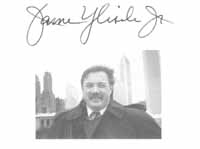A VIEW FROM CHICAGO

The mayor could be a player. Will he do what's right? by James Ylisela Jr. The convention is in the middle of the crummiest neighborhood, but the delegates won't notice. In 1973, the Rev. John Fry, pastor of Chicago's First Presbyterian Church, published a book about his experiences with the Black P. Stone Nation, a group of South Side black youths who later became the El Rukns, the city's most notorious and feared street gang. The book, Locked Out Americans, blamed Mayor Richard J. Daley, the police and the feds for making outlaws of the poor, black and militant. Today, many people would dismiss Fry's book as naive, the sort of fuzzy-headed thinking responsible for everything from decaying families to that newest automotive status symbol, The Club. Fry may have been naive, but he also was right. Many Americans are locked out. But don't expect them to generate much sympathy at the Democratic National Convention. These days helping the poor is about getting tough on welfare, and crime prevention means three strikes and you're out. The Democrats' fall campaign is best described by our own Mayor Richard M. Daley. As head honcho of the U.S. Conference of Mayors, Daley recently exhorted urban leaders to hang onto their middle-class citizens by employing tougher crime-fighting efforts, imposing more accountability on public schools and looking for creative ways to create and keep jobs. Daley means what he says. Consider what he has done to the neighborhood around the United Center as he prepares to welcome his fellow Democrats. The convention is in the middle of the city's crummiest neighborhood, but Daley has eliminated any chance that delegates will notice. Burned in the late 1960s after the assassination of the Rev. Martin Luther King Jr., and neglected in the three decades since, the West Side is in the midst of a remarkable transformation. City work crews have spent more than $30 million in the last two years building new sidewalks, paving streets and planting trees and flowers. New housing, of the $200,000 to $300,000 kind, is popping up around the House That Jordan Built. In fact, the West Side is threatening to become trendy. Daley says the improvements were in the works long before the Democrats chose Chicago as their convention site, but even his supporters can't say that with a straight face. A rejuvenated West Side plays well to the national crowd, but locally this is a no-win deal for the mayor. If Daley had done nothing, his critics would be blasting him for neglecting one of Chicago's poorest minority neighborhoods. Yet as soon as the city started pouring money into the area, Hizzoner was accused of pushing poor people out to make room, and money, for his buddies. At Cabrini-Green, the near North Side housing complex undergoing a similar redevelopment, one critic described Daley's motivations as "ethnic cleansing." Black Chicagoans are supposed to dislike the mayor. He's a Daley, son of Boss, and behind every civic improvement must lurk a secret let's-screw-black-people strategy. What's a poor mayor to do? It's enough to make the man want to quit his job and run for governor, just to get some rest. That's the trouble with politics today. It's not the Locked Out we have to worry about. It's the rest of us who are hopelessly Locked In. American politics has reached a state of rigor mortis, with little civility and no room for a legitimate change of heart. Compromise, the life blood of the process, is gone, replaced by the cold formaldehyde that allows politicians to look alive without entertaining other views. Assuming all goes well, Daley will emerge from the convention at the top of his game, a national player, and in a position to do whatever he wants with Chicago. Some pundits have suggested what he wants is to put to rest all the comparisons with his father and the disaster of 1968. But why not go for broke? Daley has an opportunity to prove his critics wrong by rebuilding a West Side that will benefit everyone, including the residents who live there now. He can keep his word by building mixed-income housing in the Cabrini Green complex, and convince the city's business leaders that investing in blighted neighborhoods makes good sense. Will Daley be the visionary leader with the confidence to do what's right, even if it sometimes threatens his own locked-in constituency? Don't bet on this one. Some say it's a mortal lock. James Ylisela Jr. teaches urban reporting at Northwestern University's Medill School of Journalism. He's the consulting editor of The Chicago Reporter. Illinois Issues August 1996 ¦ 41 |
||||||||||||||
